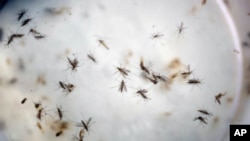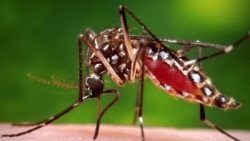Scientists have created a new app designed to identify dangerous mosquitoes based on sounds the insects make.
The app, called Abuzz, is aimed at helping fight major diseases spread by mosquitoes. The diseases - such as malaria, dengue fever and yellow fever - kill hundreds of thousands of people each year.
Haripriya Vaidehi Narayanan is one of the researchers who helped develop the app. She began work on the project as a graduate student at Stanford University. She is now with the Department of Immunology at the University of California, Los Angeles.
Narayanan told VOA that anyone with a mobile phone could use the app to identify mosquitoes. "If they see a mosquito around, they just open the phone, open up the app, point their phone towards the mosquito and hit the record button," she said.
"Then, when the mosquito flaps its wings and starts flying around, it makes that noise, that annoying buzzing noise. That noise is what gets recorded by the Abuzz app," she added.
Many diseases that mosquitoes carry do not have cures or vaccines. So, targeting the flying insects is the best way to control them. "The most important step is to know where the mosquitoes are," Narayanan said.
Traditional methods for hunting mosquitos are costly and can take a very long time. The process also requires labor-intensive trapping as well as trained scientists to identify the insects.
Manu Prakash is a professor of bioengineering at Stanford University and a lead investigator on the project. He says that out of about 3,500 different mosquito species, only about 40 are dangerous to humans.
Prakash says the goal of the project was to find out whether the mosquitoes around a person’s house are just an annoyance -- or whether they are possibly dangerous. To find out, his team decided to listen.
When mosquitoes move their wings up and down, they produce buzzing sounds. But each kind of mosquito makes a somewhat different buzzing noise. The app records these sounds.
Users of the app can get an answer by recording as little as one or two seconds of the buzzing sound. The app compares this recording to a collection of other recordings. It then predicts which species of mosquito it is most likely to be.
Billions of people around the world can use this tool with their phones. So, the researchers say they will be able to monitor mosquitoes on a much larger basis than in the past.
By crowdsourcing mosquito information worldwide, the app can help build maps of where dangerous mosquitoes are. This can help scientists and health officials identify areas where disease is likely to break out and where to target mosquito control.
Prakash said he believes this kind of widespread community effort can be an important step in fighting mosquito-causing diseases.
He added that the tool uses machine learning to get better as more people use it. "So, we're very excited that if … hundreds of thousands of people are recording mosquitoes every day - especially around the world - it will create the kind of community that is needed," Prakash said.
The development team is expected to release the Abuzz app to the public in the coming months.
Another group of researchers at the University of Oxford in Britain has been developing a similar app, called Mozzwear. That app is designed to identify malaria mosquitoes by the sound they make.
I’m Bryan Lynn.
Asher Jones reported this story for VOA News. Bryan Lynn adapted the report for Learning English. Ashley Thompson was the editor.
We want to hear from you. Write to us in the Comments Section, and visit our Facebook page.
_______________________________________________________________
Words in This Story
app – n. a mobile phone program that performs a special function
button – n. a switch you press to control a piece of equipment
flap – adj. to move up and down quickly and repeatedly
mobile – adj. able to move or be moved easily
annoy – v. to make someone slightly angry
species – n. a group of animals or plants that are similar and can produce young animals or plants
monitor – v. watch something carefully
crowdsourcing – n. he act of giving pieces of work to a large group of people or to the public in order to gather information






